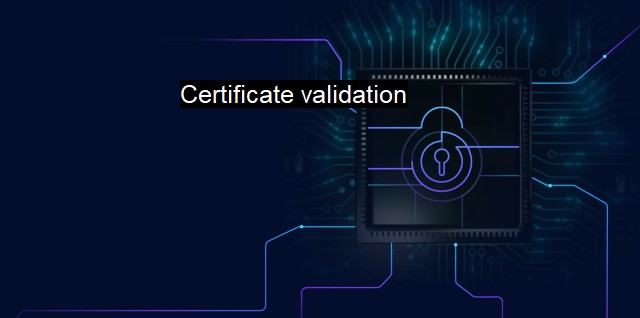What is Certificate validation?
The Crucial Role of Certificate Validation in Cybersecurity and Antivirus Protection: Protecting Against Fraudulent Activities and Ensuring Trust.
Certificate validation is a crucial element in the landscape of cybersecurity and antivirus operations. This process provides a level of assurance about the integrity of digital platforms, protecting users and their sensitive data from malicious cyber threats. certificate validation determines the credibility of digital certificates, verifying that they are issued by a trusted source (a Certificate Authority) and ensuring an encrypted, secure network connection.Digital certificates are electronic documents or files that include the certificate holder's public key and identity details. They're typically used in secure network communication, and are commonly known as SSL/TLS certificates when used in web security infrastructure. Certificate validation is important because it enables authentication when a connection is initiated, ensuring users are communicating with a legitimate server or website.
Two key players are essentially in the process of certificate validation; these are – Certificate Authority (CA) and the subject (which could be a website or application). The role of CA is vital as it provides and signs digital certificates and the subjects use certificates to assure clients and users. The CA issues certificates signing it after careful verification which includes exhaustive checks on the subject like the individual, company, or website.
The CA goes through several validation types including Domain Validation, Organization Validation, and Extended Validation. Domain Validation (DV) involves verification that the applicant has administrative control over the specific domain. Organization Validation (OV) requires more rigorous checks including organizational operations' nature, their physical location, and legal existence. Extended Validation (EV) is the most detailed level of validation, wherein intensified steps are taken to verify the legitimacy of the organization, consistent with a detailed set of established criteria.
Certificate validation prevents a wide range of potential cyberattacks. Man-in-the-middle attacks, where an unwanted third party intercepts communication between two systems, can be foiled by rigorous certificate validation. Adequate validation reassures the user that they are communicating directly with the intended party, reducing the risk of malicious interference.
Validation ensures that even if attackers could spoof a website, they wouldn't be able to display a valid certificate. This prompts modern web browsers to display alerts and provide warnings to users when any suspicious activities are detected. These alerts often ingrain suspicion in the minds of people, enough for them to reject and exit any connection without proper certification, ultimately making life difficult for hackers.
That said, while certificate validation can filter out most malicious online activity, detecting some imposters can be complex due to the sophistication of their attack vectors. Cybercriminals try to find ways around securities and employ faulty certificates that can masquerade as genuine for unwary users. To counter such activities, organizations need to embed rigorous certificate validation and revocation checking in cybersecurity processes, which can detect and nullify untrustworthy digital certificates.
Regularly updating software and security tools, performing continuous monitoring, and using real-time threat intelligence feeds will complement certification validation. An Intermediate certificate that links the subject's certificate to the root certificate can also enhance the security system in an 'SSL certificate chain.'
Certificate validation is not only significant to the assurance of secure network communications but also vital in promoting trust between parties in cybersecurity realms. Whether it's preventing phishing attempts, suppressing man-in-the-middle attacks, or ignoring unsecured connections, certificate validation serves a critical role in promoting the safe and secure transfer of data across digital networks. As cyber threats evolve and become more sophisticated, so must the methods that are used to verify and validate digital certificates, providing an environment where users can access their digital platforms continuous worry-free, and deepen their trust in network communications.

Certificate validation FAQs
What is certificate validation in cybersecurity?
Certificate validation is the process of verifying the authenticity and integrity of digital certificates used in secure communication. It involves identifying whether a certificate is issued by a trusted authority and has not been tampered with.Why is certificate validation important for antivirus software?
Antivirus software relies on digital certificates to verify the authenticity of software and updates. If a certificate is invalid or has been tampered with, the antivirus software may fail to detect malicious software and may also become vulnerable to attacks.How does certificate validation help prevent cybersecurity attacks?
Certificate validation helps prevent attacks by ensuring that software and communications are legitimate and secure. It prevents attackers from using fake certificates to impersonate legitimate websites or software, and ensures that communication is encrypted and cannot be intercepted.What are some common issues with certificate validation in cybersecurity?
Some common issues with certificate validation include expired certificates, compromised certificate authorities, and invalid certificate chains. These issues can lead to security breaches and make it difficult for users to know whether they can trust a website or software.| | A | | | B | | | C | | | D | | | E | | | F | | | G | | | H | | | I | | | J | | | K | | | L | | | M | |
| | N | | | O | | | P | | | Q | | | R | | | S | | | T | | | U | | | V | | | W | | | X | | | Y | | | Z | |
| | 1 | | | 2 | | | 3 | | | 4 | | | 7 | | | 8 | | |||||||